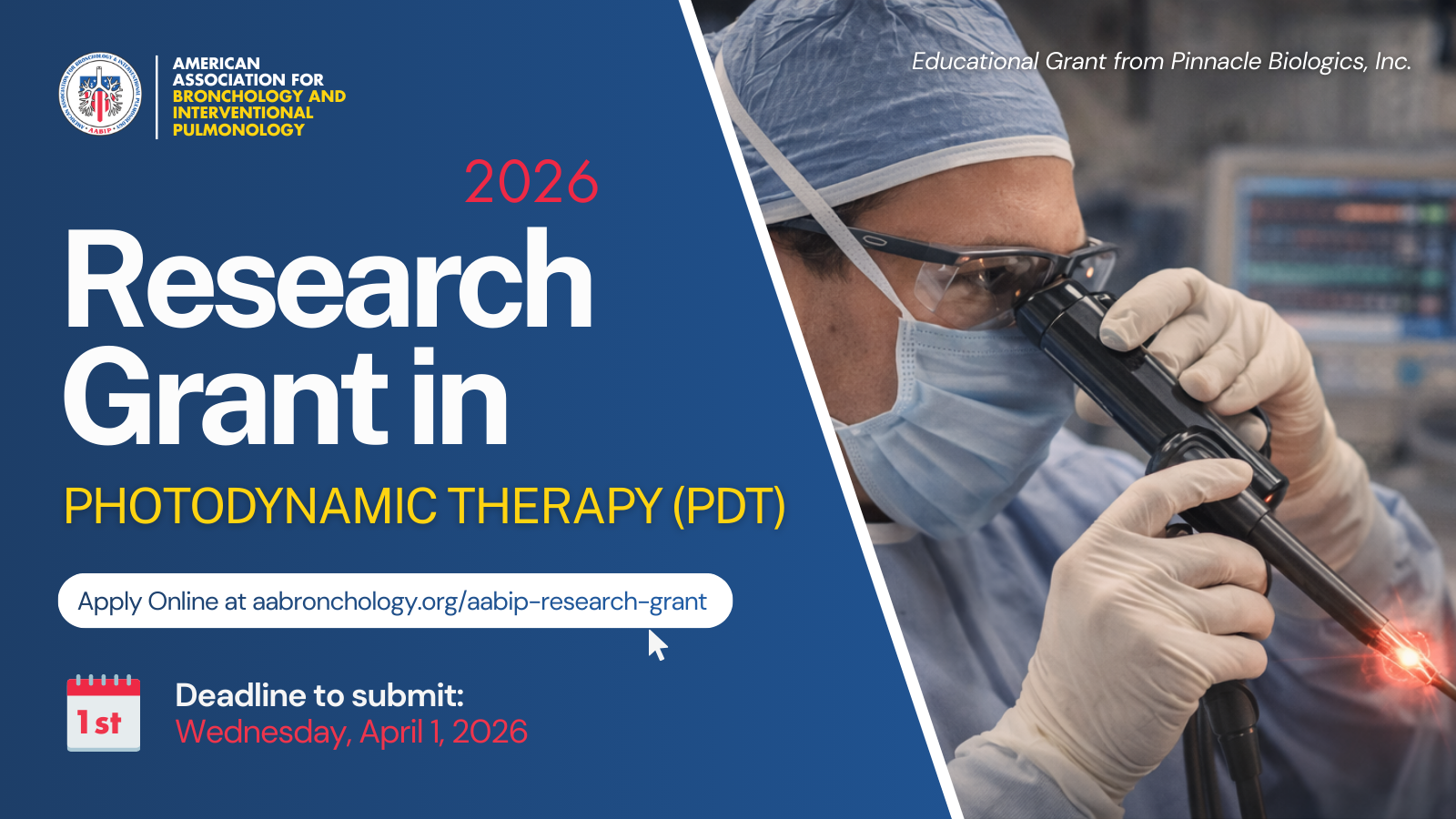AABIP Chapters
Members of the AABIP believe that there is value in developing focused Chapters to promote awareness of specific interests, gather more grassroots business, improve communication with its members, and increase awareness on what the AABIP does and can do for them. The Chapters further the purposes of the AABIP at a regional and sector level. Each Chapter represents a specific focus of interest, such as geographic or professional background. Each Chapter has one leader referred to as a Representative, which is elected by the AABIP members involved in that Chapter. Chapter Representatives collectively form the Council of Representatives that are the main vehicle through which the AABIP leadership communicates with focused interest Chapters within the membership and in turn, the Chapters keep the AABIP Board of Directors (BOD) and Membership Committee updated regarding their needs as practicing medical providers within the community of interventional chest medicine. Though having AABIP Chapters is beneficial for the interventional pulmonology community, there is a need for creating standard operating procedures. This document describes the policies and procedures governing the formation and maintenance of such Chapters. Revisions to these policies and procedures must be approved by the AABIP Executive Committee.
Specific Goals of the Chapters
- To serve as representatives of the AABIP membership and to advertise and promote its mission amongst chest physicians and medical providers with similar interests.
- To oversee and provide leadership to the variety of the educational activities and career development in the area of Interventional Pulmonology that do not otherwise fall under the purview of the AABIP Education Committee. AABIP Education Committee reserves the exclusive right to oversee and direct any educational activities taking place under the authority of this policy.
- To facilitate collaboration among the interventional pulmonologists and medical providers with similar regional and professional interests via clinical education and research projects that do not otherwise fall under the purview of the AABIP Education or Research Committee. AABIP BOD reserves the exclusive right to oversee and direct any educational or research activities taking place under the authority of this policy.
Examples of Chapter activities:
- Advocacy:
- Present an advocacy-related lecture in their communities.
- Reach out to local legislators or their staff at least regarding issues pertinent to the regional interventional pulmonology community.
- Identify and address local regulatory issues with regards to the practice of interventional pulmonology.
- Membership:
- Encourage retention of members through personal contact.
- Facilitate communication with dues-delinquent or departing AABIP members.
- Promote the use of AABIP educational and research resources.
- Communicate regularly and survey the Chapter members about membership needs.
- Provide a voice to and for Chapter members with the AABIP leadership with regard to their professional needs, including membership, education, and reimbursement.
- Education:
- Survey Chapter members about educational or professional needs.
- Disseminate evidence-based interventional pulmonology-related educational information to members in their Chapter.
- Promote AABIP educational activities to members in their region.
- Provide opportunities to engage junior professionals in Chapter activities or leadership including chapter educational programs.
Overview of Duties and Responsibilities
Chapters operate under the direction of the Membership Committee. The internal organization of each Chapter is left at the discretion of the Chapter as long as the following responsibilities and conditions are met:
- Prior approval must be obtained from the AABIP Membership Committee for any communication, including but not limited to advertising and surveys, intended to be sent external to the Chapter on behalf of the AABIP.
- Activities developed by a specific Chapter must obtain prior approval from the Membership Committee to be endorsed by the AABIP. Educational products may require approval of the Education Committee at the discretion of the Membership Committee.
- Membership to Chapters is inclusive of AABIP membership and no additional dues will be levied for participation in a Chapter. Chapter participants are required to maintain active AABIP membership.
- Chapter members and membership are all subject to the bylaws of the AABIP and are governed by the policies and procedures approved by the AABIP BOD as outlined in this document. Chapters are expressly prohibited from establishing bylaws or any policies and procedures that may conflict directly or indirectly with AABIP bylaws or governing policies.
- Chapters may raise support for approved activities to cover activity-related direct costs.
- Financial support must be restricted to a specific activity and should not exceed of the costs of the specific activity.
- Participation in Chapter activities is voluntary and will not be compensated.
- Activity-related finances are independent of the AABIP and will be managed by the Chapter.
- The leadership of each Chapter should include one representative elected by the Chapter members every 2 years. The elected Representatives must attend a conference call every quarter (organized by the Membership Committee) and must communicate with the Membership committee regarding all activities outlined in III.1 and III.2. Refer to Section IV.5.b for additional details.
Composition and Accountability of Council of Representatives (COR)
- The COR will be comprised of elected Chapter Representatives.
- Chapters startups: The Membership Committee encourages the development of new Chapters based on regional and professional focus deemed necessary and agreed upon by the AABIP BOD.
- The local organization of each Chapter is the responsibility of and left at the discretion of the individual Chapter to encourage autonomy and make the Chapter more relevant to their members.
- The term of a Representative is 2 years with eligibility for re-appointment for an additional 2 years. A Representative’s term can be prematurely terminated if the Representative is unable to fulfill their duties or if the BOD becomes aware of, and agrees that their actions or behaviors are discordant from AABIP’s strategic plan or ethical conduct. In this event, an interim Chapter representative may be elected to complete the term.
- The COR is accountable to the AABIP Membership Committee which reports to the AABIP BOD.
- The Chair of the Membership Committee reserves the right to inform the BOD of any Representatives’ misconduct or consistent failure to participate in the COR’s tasks of advocacy, education and membership. The Representative can be dismissed with a simple majority vote from the AABIP BOD.
- The Representative or their appointees are expected to attend at least 50% of the scheduled conference calls each year. Chapter updates via email or other reporting mechanisms are permitted at the discretion of the Membership Committee Chair.
- The Representative will deliver a quarterly report which will be presented at the BOD meeting and subsequently may be made publicly available by the AABIP via the newsletter, webpage, and/or social media.
Disclaimer
The information provided and opinions reflected in the statements of individual Representatives or publications of the Chapters represent the views of the author(s) or position of the Chapter only. The AABIP does not share, endorse, or warrant any such information or opinion published or provided by a Chapter unless specifically indicated otherwise.
Date of Approval 04/02/18
AABIP CHAPTERS
CALIFORNIA
Russell Miller, MD
CONTACT
PRACTICE GROUP CHAPTERS
ANESTHESIA
Mona Sarkiss, M.D., Ph.D.
CONTACT
|









